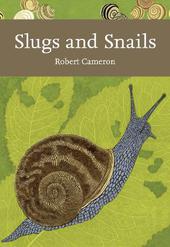
|
Slugs and Snails (Collins New Naturalist Library, Book 133)
Paperback / softback
Main Details
| Title |
Slugs and Snails (Collins New Naturalist Library, Book 133)
|
| Authors and Contributors |
By (author) Robert Cameron
|
| Series | Collins New Naturalist Library |
|---|
| Series part Volume No. |
Book 133
|
| Physical Properties |
| Format:Paperback / softback | | Pages:528 | | Dimensions(mm): Height 216,Width 149 |
|
| Category/Genre | Pets and the Natural World |
|---|
| ISBN/Barcode |
9780007113019
|
| Classifications | Dewey:594.3 |
|---|
| Audience | |
|---|
| Illustrations |
(Over 150 colour photographs), Index
|
|
Publishing Details |
| Publisher |
HarperCollins Publishers
|
| Imprint |
William Collins
|
| Publication Date |
15 December 2016 |
| Publication Country |
United Kingdom
|
Description
Slugs and snails are part of the great Phylum Mollusca, a group that contains creatures as varied as the fast-moving squid or the sedentary clams, cockles and mussels. The largest group, however, are the gastropods, animals originally with a single foot and a single coiled shell. They are the only group of molluscs to have representatives living on land as well as in the sea and freshwaters. This book is about the slugs and snails that live on land. For creatures living on land they are bizarre: snails carry a huge weight of shell; both snails and slugs move slowly relative to their potential enemies; and most are not well camouflaged. Their wet bodies are at the mercy of dry weather and their movement is very wasteful of energy and water. Despite all this, they are found from the tundra through to deserts, and on all continents apart from Antarctica. They have reached the most remote oceanic islands and undergone amazing evolutionary developments. In terms of species, they outnumber all land vertebrates. As pests, slugs and snails are all too familiar. The damage that they can cause in our gardens and to agricultural crops can be considerable and they are remarkably tenacious and thus difficult to control. In this long-anticipated New Naturalist volume, Robert Cameron introduces us to this remarkable group of gastropods. While dealing with the natural history of slugs and snails of the British Isles it also ventures across the world to explore the wide range of structures and ways of life of slugs and snails, particularly their sometimes bizarre mating habits, which in turn help to illuminate the ways in which evolution has shaped the living world. Snails can be and have been used to explore important ideas in evolutionary biology, in biogeography and in ecology, and Cameron draws out these explorations, looking specifically at the role of evolution in determining how our understanding of snails has developed over the years.
Author Biography
Robert Cameron developed his interest in snails as a student, lured away from birds by his supervisor, Arthur Cain. Starting in Portsmouth, his career has been mainly in Adult Education at Birmingham and Sheffield Universities. His PhD involved the well-known shell polymorphism in Cepaea snails, and that has remained a core interest, leading to participation in the Evolution MegaLab set up to commemorate Darwin Year in 2009. The biogeography and ecology of land snails have remained a focus throughout his career and beyond, taking him to Australia, Canada, Greece, Madeira, the Azores and the countries of Central and Eastern Europe. He was the co-author (with Michael Kerney) of the Field Guide to the Land Snails of Britain and North-West Europe (1979) and has produced keys to the British species. He is the author or co-author of more than 140 papers on snails.
Reviews'I can unhesitatingly recommend this book. It is extremely thorough in its coverage and is an engrossing read, packed with an amazing range of fascinating information. It is generously illustrated with numerous pictures, illustrations and charts [...] This groundbreaking volume should remain a standard work on the natural history of snails and slugs for many years.' British Wildlife Praise for the New Naturalist series: 'Taken either individually or as a whole, they are one of the proudest achievements of modern publishing' The Sunday Times 'The series is an amazing achievement' The Times Literary Supplement 'The books are glorious to own' Independent
|